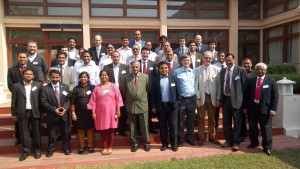17th February 2014 Mumbai, India
Exploring UK-India partnerships in offshore wind energy
O mighty wind!
Whether onshore or offshore,
You seldom rescind
Whether in Edinburgh or Tuticorin!
The UK Science & Innovation Network India recently organised workshops in Ahmedabad (February 03/14) and Chennai (February 06/14), in partnership with Knowledge Economy colleagues, to explore the potential for UK-India partnerships in offshore wind energy. We received tremendous support from our colleagues in the Energy Climate & Growth Unit (ECGU) and UK Trade & Investment (UKTI) for these workshops. A 5-member UK delegation consisting of Prof. Simon Watson, Dr. Simon Hogg, Prof. Bill Leithead, Dr. Maurizio Collu, and Dr. Paul Ellsmore visited India to contribute to the bilateral dialogue on potential partnerships in offshore wind energy. The proceedings of the workshops have now been published in the form of a report.

The 1-day workshop in Ahmedabad got off to a flying start with addresses by Mr. Shobhit Srivastava from the Ministry of New and Renewable Energy (MNRE) and Mr. Rajendra Mistry from the Gujarat Power Corporation Limited (GPCL), each of whom shed light on the national and state level policies for offshore wind energy. With a coastline of nearly 7600 km, India holds tremendous potential for drawing electrical power from offshore wind energy. In 2013, the Ministry of New and Renewable Energy (MNRE) released its draft national policy on offshore wind energy. Among other features, the policy will allow for leasing of the sea bed and a single window procedure for statutory approvals (National Offshore Wind Energy Authority (NOWA).

Then, the UK speakers discussed a range of topics including mimicking conventional generation by wind farm control, offshore floating wind turbine foundations, asset management aspects of turbine systems technology, and the offshore wind resource. The UK is the world leader in offshore wind energy. It has been projected that by 2020, about 18-20 % of UK’s electricity annually will be supplied by offshore wind energy. The Crown Estate has mapped the offshore renewable energy (offshore wind, wave, tidal) activity in the UK. It was also recently reported that the UK might increase its subsidies for offshore wind farms to encourage long term investment.
At the workshop, the representatives from organisations including Suzlon, DNV GL, MGLI, EKI Energy Services, PDPU, HR Wallingford, IT Power and Oldbaum Services spoke on a range of topics including the capabilities across the wind energy value chain, the underwater perspective of offshore wind, and offshore wind resource assessment methods and issues. The various presentations were interspersed with engaging group discussions on the strengths and research needs of the UK and India, and identification of potential areas for collaboration.
Vimal Subramanian, Knowledge Economy Adviser based in the British Deputy High Commission Chennai, coordinated the 1-day workshop and site visits in Chennai. The UK delegation toured the facilities at the Centre for Wind Energy Technology (C-WET), National Institute of Ocean Technology (NIOT), and the Indian Institute of Technology (IIT) Madras. While C-WET is a centre of excellence for wind energy technologies under the MNRE, NIOT develops various engineering technologies for the marine ecosystem in the exclusive economic zone (EEZ), and falls under the Ministry of Earth Sciences (MoES). The IIT Madras is the only one among the various IITs to have an Ocean Engineering department. The UK delegates visited the IIT’s facilities including random wave flume, wave-cum-current flume, shallow water wave flume, and towing tank. The IIT Madras offers M.Tech degree programmes in offshore structural engineering, exclusively for L&T Hydrocarbon.

In the UK, the offshore renewable energy (ORE) catapult centre in Glasgow was established by the Technology Strategy Board (TSB) to accelerate the transfer of emerging offshore renewable energy technologies to the marketplace, and thereby drive economic growth. Watch this space for my upcoming blogs about the ORE catapult centre and interview with Dr. Paul Ellsmore from the centre. And finally, the brief impressions below from a couple of the visiting UK delegates capture the potential for UK-India partnerships in offshore wind energy:
“There seems to be a strong will in India to move wind power offshore but the next steps are uncertain. After visiting a number of institutes and talking to researchers, there is clearly relevant expertise and knowledge in the country. The UK has a good lead in offshore wind power development and has learnt a lot from the early offshore wind farms. I am confident that we have much to offer both from the academic side through centres such as the Supergen Wind consortium and from drawing on UK industrial expertise. It should be stressed that the UK also has something to learn from future cooperation with India and has the opportunity to develop more innovative and cost-effective solutions for offshore wind energy.” – Prof. Simon Watson, Loughborough University
“My first ever visit to India was a great experience, both personally and professionally. The workshops and visits to facilities were an excellent way for me to understand the offshore renewables expertise, capabilities and potential in India. I have made contacts that I am sure I will maintain and develop.” – Dr. Paul Ellsmore, Offshore Renewable Energy (ORE) Catapult centre, Glasgow
“It was most stimulating to hear first-hand about India’s ambitions in Wind Energy. The enthusiasm of everybody we met was very evident. I came away from the discussions convinced that future collaboration in Wind Energy research between the UK and India would be very useful and that both parties could gain much.” – Prof. William Leithead, University of Strathclyde
good blog